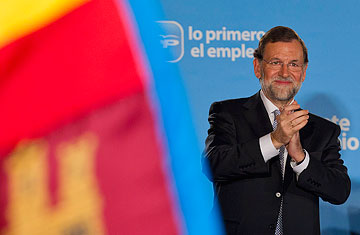
Conservative Popular Party candidate Mariano Rajoy applauds with the crowd after winning the general elections in Madrid on Nov. 20, 2011
If the recent removals of Italian Prime Minister Silvio Berlusconi and Greek Premier George Papandreou were not enough to demonstrate the power of the economy to bring down entrenched political leaders, witness the elections Sunday night, Nov. 20, in Spain. As Prime Minister, José Luis Rodríguez Zapatero pulled Spain's troops out of Iraq within weeks of taking office, legalized gay marriage, cracked down on domestic violence, eased access to abortion and divorce and, to all appearances, helped bring an end to the Basque separatist group ETA's 40-year scourge of terrorism. But with the flailing economy outweighing all other concerns, none of those achievements were enough to protect his Socialists, now led by Alfredo Pérez Rubalcaba, from a sound thrashing at the hands of Mariano Rajoy and his conservative Popular Party.
Although the details of his plans to revive the economy were deliberately vague, Rajoy led his party to a victory resounding enough to give it an absolute majority in the Spanish parliament, its 186 seats the party's best result since Spain's return to democracy in 1976. Conversely, the Socialists lost 59 seats, falling to 110, the party's lowest level ever. "Spain wants to know, finally, that there's someone at the helm," says Antonio Argandoña, a professor at IESE Business School in Navarra.
It's not hard to figure out what he means. Unemployment in Spain currently stands at 21.9% and rises to over 40% among those under age 30. Austerity measures have brought significant reductions to social services and the salaries of public employees but have not been enough to keep the country on track to reduce its deficit to a promised 4.4% by 2012. And as interest rates on new debts climbed last week to levels not seen since the introduction of the euro, Spain became the latest cause for concern about the euro zone's ability to hold together.
In response to those problems, Rajoy, who lost in two previous attempts to become Prime Minister, said creating jobs is his first priority and suggested that by reforming labor laws and stimulating the economy with tax breaks for businesses, he could do so without raising taxes. In his victory speech, he emphasized his willingness to enforce Europe's austerity demands, adding, "We will stop being part of the problem and return to being part of the solution."
His supporters believe such a plan is viable; as proof, they point to the successful record of Rajoy's conservative predecessor José María Aznar, who served as Prime Minister from 1996 to 2004. "In 1996, Aznar had to enforce some tough measures, like freezing public salaries, in order to reduce the public deficit," says Antonio López-Isturíz, secretary general of the European People's Party. "But he told people, 'If you do this, we will get into the E.U.' That was the holy grail. The situation is worse today, but there is still a holy grail: if you do this, Spain will be in the first division of the E.U. We can't afford to be in the second."
But Rajoy must act quickly. "It's understandable that up until now, Rajoy hasn't been very concrete," says Argandoña. "But [the Popular Party leaders] have to get their plan on the table now. The process is going to be very long, but restoring confidence in the Spanish economy has to be goal No. 1, and that's the only way to do it."
Because billions of euros stand in the way of reaching Spain's target deficit of 4.4%, the plan will likely include more cuts in social spending. Besides the risk of social unrest, those cuts also carry a danger of stanching much needed growth, even though they are accompanied by tax breaks for businesses. "The Popular Party always believes that money is better in the hands of individuals," says Jorge Fabra, a former rector of Madrid's Complutense University and the founder of Economists Confront the Crisis, a group formed to challenge prevailing views about the economy. "But the state knows better where it should go, and it can direct money to areas like health care, education, innovation and renewable energy, where growth opportunities lie."
Others, however, wonder if, even with its resounding victory, anything the new government does will have much impact on the crisis. "This really isn't about individual countries anymore," says Soledad Pellón, a market strategist for the Madrid branch of IG Markets. "Like Greece and Italy, Spain has very little room to maneuver. We're all at the mercy of what Germany and France do next."
